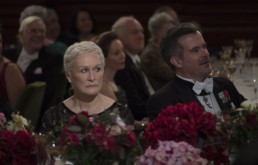'The Wife' Review: Glenn Close Gives a Hypnotizing Performance
Three words: Powerful eye contact…
...or should I say, lack thereof. The Wife is a dramatic 100-minute piece that projects the true conflict of love and demonstrates the power of women, all at the creative hand of director Björn Runge. Who knew that so much of the acting done in this film, mainly by Glenn Close’s performance as Joan Castleman, would be guided by the focus on her eyes?
Each glimpse of her stoic nature as the wife of Joseph Castleman, played by Jonathan Pryce, reveals the chaos that lies behind Joan’s composed features. Each scene is magnetized by emotional reaction shots following Joan as she holds her tongue and takes her role as a wife with strength and grace until she just about reaches her breaking point. This focus on eye contact gives The Wife its energy and will leave you staring intently, heart-in-hand, waiting to see how Close will deliver the next line. This anticipation had the entire screening room clapping or shouting “Yes!” with approval for the womanly strength she exudes.
This husband and wife’s history is complicated. Whose isn’t? But this twisted story of a woman with talent and a man with the gender power to put it to fame propels the screenplay like no other, as the truth unfolds and emotions deepen. As a woman writer, this film struck a personal chord on the wildly accurate struggle of those who aspired to be the next “big thing” in literature within history’s confining standards of being, well, male. What fuels the majority of this storyline are the flashbacks that detailed Joan’s humble beginnings as an Ivy League student of a then-married Professor Castleman. A love affair and many writing sessions later, the two develop a great, youthful love that stands true for the entirety of the film, even in the most hopeless of scenes. With Joan’s incredible writing talent and Joe’s endless mind of ideas, the couple makes a fantastic pair. That is until Joe wins the Nobel Prize in Literature and a rumor swirls that Joan might be the ghostwriter for all of Joe’s repertoire of famous novels.
Based on the novel of the same name by Meg Wolitzer, 'The Wife' delves into the frustrating history of women in writing and the many roadblocks that have posed threats to those who pursued a dream to write professionally.
Heartbreaking is the first word I think of when I look back on this incredibly powerful film. Based on the novel of the same name by Meg Wolitzer, The Wife delves into the frustrating history of women in writing and the many roadblocks that have posed threats to those who pursued a dream to write professionally. Through the 50s and 60s, Joan can be seen fighting her way toward the glass ceiling, only to find herself swept under the rug by her husband’s booming success in the literature world. Joan is the wife, the supporter and the entire backbone of Joe’s success with little to no real credit for the king she created amongst men. She’s fed up with being the wife of a literary legend and being defined as merely his "muse." She’s exhausted, but she is resilient.
It is so important that a power piece should be highlighting yet another industry that has been overshadowed by society’s preferences of male dominance. While the film is set in the 90s, the topic is exceptionally relevant and puts us right in the middle of a whirlwind love story with a fatal flaw. Runge took the cinematic elements to the extreme, juxtaposing the frigid, loneliness of Stockholm’s winter to the fractured marriage of the Castleman’s. His decision of using jarring, wobbly wide shots of the couple’s surroundings and steady, medium shots of the two when interacting in these settings, forced your attention to be grabbed by the main character’s performances at all times. He kept you appropriately involved in the secrets, the drama, and the love.
The Wife will have you laughing just when you thought you’d be crying for the remainder of the film and rooting for the protagonist right up until the last minute.
'What Will People Say' Review: A Duel Between Cultural Identities
Your jaw will drop when you realize this is an autobiography.
For a sophomore film by director Iram Haq, What Will People Say is a true work of art. Just when you thought cinematography couldn’t get any better… this dramatic and astounding film is proof that the beauty of cinema is not only defined by “good" dialogue to promote character development. Not being a native speaker of Norwegian or Urdu languages does not deter you from being swept away in the intensity of this father-daughter relationship filled with a conflict of interest between love for the other and respect for their strict Pakistani culture.
Maria Mozhdah finds her breakout, debut role as Nisha, the daughter of Pakistani parents raising a family in Norway. Surrounded by a Westernized lifestyle, Nisha seemingly leads a normal life as a 16-year-old girl whose family treasures her obedience and high marks in school. Unbeknownst to her family, she starts to sneak out to party and spend time with her friends as a teenager tends to do; however, her double life comes to a head when her father (Adil Hussain, Life of Pi) catches Nisha with her boyfriend in her bedroom one night. Assuming the worst, he takes Nisha to Pakistan, his native land, against her will.
The shame and humiliation a family experiences when a child of theirs goes against the grain of what is socially acceptable in this culture is so unbearable that her father goes to extreme measures to punish her and ensure she will act morally from then on. Nisha is forced upon family members in a small, potentially unsafe town where she will have no option but to adapt to her foreign environment and question her identity as a Norwegian citizen with Pakistan blood. How can she love her family so much but then question entirely their methods of familial traditions? The entire film places each side on trial and juxtaposes two lifestyles that continue to conflict in almost every single way.
How can she love her family so much but then question entirely their methods of familial traditions?
Some scenes were difficult to watch as I struggled to understand Nisha’s fear to speak out. Every time she attempts to speak her truth, she is continuously struck down so this fear eventually begins to take shape naturally. While the storyline is gripping in every sense, it is continuously visually-enthralling, coupled with the only music I could imagine to go along with it. The film’s score is the perfect lyric-less background that extracts intensity from the already "hold-your-breath" moments that Mozhdah’s performance creates. Her facial expressions communicate volumes that transverse any language without even utilizing words.
Theme-wise, the issue of women’s rights is a tricky one when it is culturally-acceptable to value arranged marriages and to grant a father permission to punish his daughter as he wishes, despite the technical unlawfulness. This film explores the avenues of a young women’s powerlessness when she is left without the right to have her own voice and speak up for herself. As immigrants in a foreign country, the family struggles to find the balance between enforcing their familial rules and allowing their daughter’s happiness to stem from a small taste of freedom. By the end of What Will People Say, you will be left aching for more while at the same time feeling entirely satisfied with the compromise found between loss and love.
- Audience Award – AFI Fest
- Audience Choice Prize – Les Arcs European Film Festival
- Winner, Audience Dragon Award - Götebo
rg International Film Festival - Winner, Best Actor - Bif&st Bari International Film Festival
- Winner, Femme de Cinéma Award - Festival de Cinéma Européen des Arcs
'Night Comes On' Review: The Power of Sisterhood
A director may only dream to have such a critically-acclaimed film to look back on as their silver screen debut.
Jordana Spiro’s film, Night Comes On, knocks it out of the park with an emotionally-charged story of sisterly love and the bonds that even the most heart-wrenching familial issues cannot break. Starring Dominique Fishback from HBO’s “The Deuce" and introducing 10-year-old Tatum Marilyn Hall, this winner of the NEXT Innovator Prize at Sundance explores difficult-to-swallow topics surrounding inner-city lifestyle, juvenile delinquency, and the foster care system.
How does a young adult recover and excel in a world where society is programmed to reject you?



